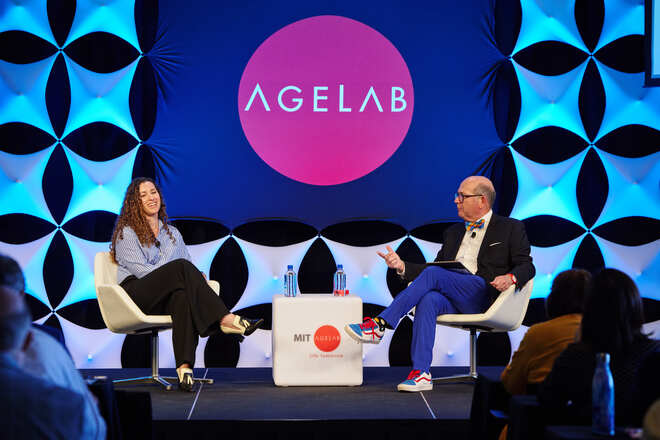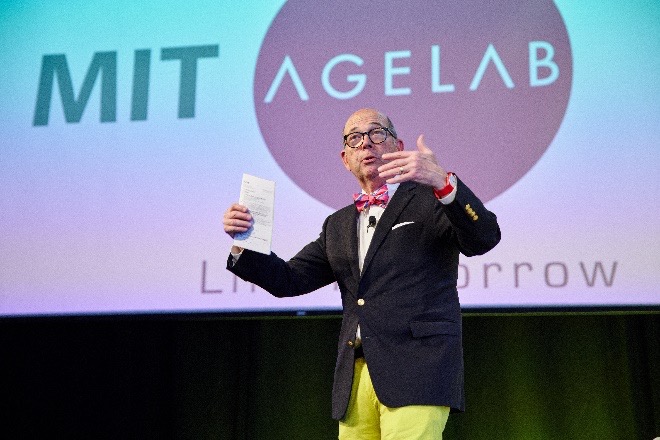AgeLab Hosts Annual Member Forum
by Adam Felts
On March 11th and 12th, the AgeLab held its 2025 Member Forum, an annual symposium for sponsor organizations. The event, titled “There's No Place Like Home: Rethinking the 'Where' and 'How' of Longevity Planning,” centered on professionals, services, and technologies that are becoming increasingly essential for people to live independently in older age.
The first day of the forum focused on service design: how advisors and experience providers from across industries are meeting the wants and needs of clients, and what financial advisors can learn from them. The opening panel of the symposium was a fireside chat between AgeLab Director Joe Coughlin and Laura Perlman, Senior Vice President of Marketing at Viking Cruise Lines. Perlman talked about Viking’s utilization of AI to analyze their customer data and create a robust profile of their ideal consumer.

A follow-up panel moderated by AgeLab researcher Adam Felts featured professional advisors from the disparate fields of wedding planning, luxury travel, and concierge medicine. The central verdict of the panel was that these professionals, in their capacity as advisors, have far more in common than they might first appear, and share much in common as well with the financial professionals who help people plan for retirement.

The keynote speaker for the forum’s second day was Richard Playter, CEO of Boston Dynamics, who discussed the increasing commercial viability of its quadrupedal robot, Spot, and the development of humanoid robots that can learn using AI. “AI is like rocket fuel for robots,” he said. The company remains focused on industrial applications for its robots, but in the next couple decades, they may be commercially viable in residential environments.

A panel moderated by Lauren Cerino featured real estate professionals talking about the landscape of senior housing, highlighting that baby boomers currently represent the largest generation in the United States, and the need for expanded housing stock to accommodate people who want to age in place in later life.

L. Jasmine Kim, Head of Care@Home at Samsung Health, and Diana Gelston, Chief Commercial Officer of Best Buy Health, sat on a panel moderated by Chaiwoo Lee to discuss how today's smart devices are evolving into tomorrow's comprehensive care systems. Kim noted that the U.S. has the largest gap between people’s lifespans and their healthspans, and that new technologies, such as tools that monitor people’s gait and could identify cognitive decline, may help close that gap.

Lisa D’Ambrosio moderated a panel of professionals who are involved in helping older adults age-proof their homes, including a smart home installation professional, an aging life care manager, and a senior relocation specialist. Kate Grondin, a senior move manager, noted that older adults may not have a clear idea of the costs of moving in later life, and may be unprepared for the cost of a move in and of itself, regardless of the relocation destination.

The final panel of the forum, which was moderated by Luke Yoquinto, highlighted services that can play a role in providing care and support to older adults, including remarks from Briana Gilmore, Head of Global Accessibility Policy at Uber, who highlighted her company’s efforts to become a trusted transportation service for older adults and people with disabilities.

Aside from the symposium presentations, the forum featured interactive stations for attendees to consider the costs of home technology in retirement, imagine where they might want to live in older age, and photograph themselves with the AgeLab’s aging simulation suit AGNES or Boston Dynamics’ quadrupedal robot Spot.



We extend special thanks to the Corporate Member organizations who helped the AgeLab bring this event to life: Abacus Life, Bank of America, CI Financial, Corebridge Financial, Edward Jones, Hartford Funds, Manulife/John Hancock, MassMutual, Raymond James, RBC, SunLife, TIAA, and Transamerica.

